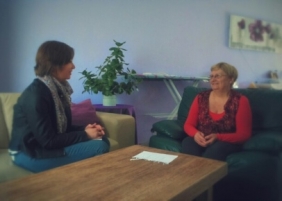Belgium: switching to community mental health care

Belgium has traditionally relied strongly on institutional psychiatric care to treat people with mental health and neurological disorders. In response to WHO’s Mental Health Action Plan 2013–2020 – which calls for comprehensive, integrated and responsive mental health and social care services at the community level – and as part of the national mental health reform that began five years ago, Belgium has shifted from traditional, large psychiatric institutions to a modern, inclusive care system with increased focus on the community. This was made possible by reallocating finances from institutional care to community mental health teams.
The Belgian health authorities gradually established multidisciplinary outreach teams in most Belgian regions. These teams provide people with mental health conditions, who traditionally would have been hospitalized, the opportunity to choose where they wish to receive treatment and care. The treatment and care provided by these teams have shown to prevent long-term hospitalization.
In the Leuven region, where 600 000 people live, a crisis team and five outreach teams totalling 45 workers were created to treat people with severe mental health conditions and disorders. After five years, the number of hospital stays in that region diminished by 20%.
Multidisciplinary crisis teams and outreach teams were established. These teams serve all persons eligible for an acute psychiatric admission, and treat and care for a selected subgroup of persons with severe and long-term needs. They are designed to tackle short-term acute issues over a few days to weeks, or to provide long-term care.
Multidisciplinary crisis teams provide crisis resolution for people with (sub)acute psychological problems, through short-term home treatment and the strengthening of social networks. Working closely with primary-care workers and social services, the crisis teams prevent or shorten psychiatric admissions trough practical support, medication and family therapy.
Outreach teams provide recovery-oriented care in the home environment for people with long-term severe mental health conditions who are often difficult to reach. These generalist, multidisciplinary teams provide care at home and support social inclusion, focusing on employment and accommodation.
The teams offer care and treatment in a coordinated and integrated manner, focusing on continuity of care and working closely with primary health-care workers and medical specialists. They use detailed, individual care plans developed in consultation with people with mental health conditions and their social context, including warning signs of relapse and crisis plans, and clearly describing everyone’s tasks and responsibilities. Within their own environment, people with mental disorders and those closely involved are supported by their assigned team to actively participate in their treatment.
People with mental health conditions and their families value the opportunity to choose treatment options and generally prefer being treated and cared for in their home environment. The new model is improving health and social outcomes and preventing or reducing hospital stays. This is a welcome result of the mental health reform in Belgium.
